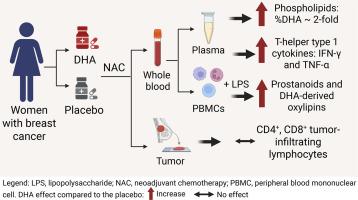DHA- win试验中二十二碳六烯酸(DHA)对接受新辅助化疗的乳腺癌患者血浆细胞因子、氧脂素和肿瘤浸润淋巴细胞的影响
IF 4.9
2区 医学
Q1 BIOCHEMISTRY & MOLECULAR BIOLOGY
引用次数: 0
摘要
背景:补充二十二碳六烯酸(DHA)与乳腺癌新辅助化疗(NAC)期间免疫变化的临床试验有限。本研究通过评估血浆炎症和心脏损伤标志物、肿瘤浸润淋巴细胞(TIL)比例以及响应体外免疫挑战产生的n-6和n-3衍生的氧脂素,评估了NAC期间补充DHA对全身和肿瘤免疫调节的影响。方法:在NAC期间的基线、9周和15周,从DHA治疗乳腺癌妇女的新辅助设置(DHA- win)试验的参与者中收集静静脉血液,该试验比较了DHA富集藻类(4.4g/天;N =23)和安慰剂(N =26)在18周内。采用电化学发光法测定血浆标志物。免疫组化法鉴定肿瘤组织中CD4+和CD8+ TILs,液相色谱-串联质谱法测定脂多糖刺激外周血单核细胞上清中的氧脂类。结果:与安慰剂相比,补充DHA导致血浆细胞因子IFN-γ、TNF-α和IL-17A的增加(p相互作用< 0.05)。在DHA组中,与基线相比,这些细胞因子的浓度在15周时增加(结论:这些结果表明DHA可能通过促进氧脂素和细胞因子浓度的增加来增强免疫反应,可能对乳腺癌NAC期间的患者有益。本文章由计算机程序翻译,如有差异,请以英文原文为准。

The effects of docosahexaenoic acid (DHA) on plasma cytokines, oxylipins, and tumor-infiltrating lymphocytes from women with breast cancer undergoing neoadjuvant chemotherapy in the DHA-WIN trial
Clinical trials on docosahexaenoic acid (DHA) supplementation and immune changes during breast cancer neoadjuvant chemotherapy (NAC) are limited. This study evaluated the impact of DHA supplementation during NAC on systemic and tumor immune modulation by assessing plasma inflammatory and cardiac damage markers, tumor-infiltrating lymphocyte (TIL) proportions, and n-6- and n-3-derived oxylipins produced in response to an ex vivo immune challenge. Venous blood was collected at baseline, 9, and 15 weeks during NAC from participants in the DHA for Women with Breast Cancer in the Neoadjuvant Setting (DHA-WIN) trial, which compared DHA-enriched algae (4.4g/day; n=23) with a placebo (n=26) over 18 weeks. Plasma markers were measured using electrochemiluminescence assays. CD4+ and CD8+ TILs were identified in tumor tissue by immunohistochemistry, and oxylipins were quantified in the supernatant of lipopolysaccharide-stimulated peripheral blood mononuclear cells via liquid chromatography–tandem mass spectrometry. DHA supplementation resulted in greater increases in the plasma cytokines IFN-γ and TNF-α compared to placebo (P-interaction < .05). In the DHA group, concentrations of these cytokines increased at 15 weeks compared to baseline (P < .05). No differences were found between groups for other immune markers or the proportion of TILs. Compared to the placebo, DHA led to an overall increase in total oxylipin concentrations (P < .05) and higher production of n-6 fatty acid-derived oxylipins, particularly prostanoids, and n-3 fatty acid-derived oxylipins, including 13-HDoHE. These results suggest that DHA may enhance immune responses by promoting an increase in oxylipin and cytokine concentrations, potentially benefiting patients during breast cancer NAC.
求助全文
通过发布文献求助,成功后即可免费获取论文全文。
去求助
来源期刊

Journal of Nutritional Biochemistry
医学-生化与分子生物学
CiteScore
9.50
自引率
3.60%
发文量
237
审稿时长
68 days
期刊介绍:
Devoted to advancements in nutritional sciences, The Journal of Nutritional Biochemistry presents experimental nutrition research as it relates to: biochemistry, molecular biology, toxicology, or physiology.
Rigorous reviews by an international editorial board of distinguished scientists ensure publication of the most current and key research being conducted in nutrition at the cellular, animal and human level. In addition to its monthly features of critical reviews and research articles, The Journal of Nutritional Biochemistry also periodically publishes emerging issues, experimental methods, and other types of articles.
 求助内容:
求助内容: 应助结果提醒方式:
应助结果提醒方式:


